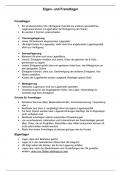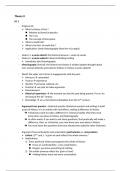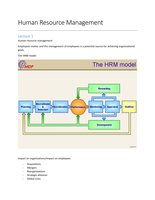Betty Fung LLB II
Limitation Ordinance and Adverse Possession
Structure
• What is the limitation period under the Limitation Ordinance?
• When does the right of action accrue? When does time begin to run?
• Whether the claimant’s action constitutes adverse possession?
• What is the adverse possessor’s title and rights?
Limitation Period
• s.7(1): actions for recovery of land by the Government is 60 years
• s.7(2): actions for recovery of land by any person are statute-barred after 20 years (before 1
July 1991) and 12 years where the right accrued after that date
Accrual of right of action
• s.8(1): if the original paper owner assigns the land when it is in adverse possession by a
squatter, the adverse possession continues against the new paper owner and time does not
start afresh
• s.13(2): a second squatter can add the period of possession of the first squatter to his own
period of possession to complete the period of adverse possession (Ricas Properties Ltd)
Dispossession or discontinuance of possession
• previously, dispossession: where the owner is literally driven out by possession by the
adverse possessor who claims adverse possession (“ouster”)
o “‘dispossession’ of the paper owner in any case where a squatter assumes
possession…except in the case of joint possessors, possession is single and exclusive”
(JA Pye (Oxford) Ltd v Graham)
• dispossession: adverse possession by a squatter so that the owner can no longer be in
possession
• discontinuance of possession: abandonment of possession by the owner
• in the absence of evidence, the paper is deemed or presumed to remain in possession:
rebuttal of this fairly heavy presumption is required
• Buckinghamshire County Council v Moran: the claimant must show a sufficient degree of
possession and that he had the necessary animus possidendi…where the claimant was
aware of the owner’s intended future use of land, very clear evidence of possession and
animus possidendi was required
• Man Kam-tong v Man Lin-tai: where the paper owner intended to use the land in future for a
particular purpose, the claimant’s use that was not inconsistent with such use could amount
to adverse possession, and what the claimant had to prove was still factual possession and
animus possidendi
Adverse possession
• JA Pye (Oxford) Ltd v Graham: (1) sufficient degree of physical custody and control (“factual
possession”) and (2) an intention to exercise such custody and control on one’s own behalf
and for one’s own benefit (“intention to possess”)
o such intention may be, and frequently is, deduced from the physical acts themselves
Factual possession
• enclosure is the strongest possible evidence
• possession must not be with permission, consent or license from the owner. Common Luck
Investment Ltd: a mortgagor who continues in possession after default cannot be regarded
1
,LLAW2014 Land Law II
Betty Fung LLB II
as being in adverse possession because, until the mortgagee has exercised his right of
possession, the mortgagor remains in lawful possession of the mortgaged property
• must be open and unconcealed, and not secret (Lord Advocate v Lord Lovat), must be
visible to the owner so that he has every opportunity to challenge the intruder’s possession
within the limitation period
• J A Pye (Oxford) Ltd v Graham: Pye was the paper owner to certain agricultural land. The
land was fully enclosed and the access through a gate was locked by a padlock. The key
was controlled by the neighboring farmer Graham. Until 31 August 1984 the farmer used the
land with the owner’s permission for grazing. He had been willing to pay for grazing rights if
requested to do so. Without such request, he farmed the land all year around for the next 14
years without the owner’s permission and the owner did nothing to the land
o The grazing agreement expired on the 31 December 1983…the Grahams were expressly
required to vacate the disputed land. But the Grahams did not vacate the disputed land
either then or at any later date. They…did things on the disputed land that they would
have no right to do under the old grazing agreement even if it had still been in force…the
objective fact demonstrate that the Grahams made such use of the disputed land as they
wished irrespective of whether it fell within the terms of any hypothetical grazing
agreement
• Powell v McFarlane: The D was the paper owner and the vendor had planted a large no. of
Christmas tree according to the contract. D left. With the help of friends, the plaintiff cut hay
and feed the family cow. He made the fence stock proof. He left the cow grazing on the
land. The plaintiff went shooting from time to time on the land and arranged a clay pigeon
shoot. Over the years the first defendant’s wife visited there from time to time but found
nothing unusual.
o A person…seeks to show that he has dispossessed the owner, should be required to
adduce compelling evidence that he had the requisite animus possidendi in any case
where his use of the land was equivocal
o What he did…was to take various profits from the land… and to effect rough repairs to
the fencing, merely to the extent necessary to secure his profits by making the land
stockproof…in particular for a 14 or 15-year old boy
• Buckinghamshire County Council v Moran: the D had acquired complete and exclusive
physical control of the plot. He had secured a complete enclosure of the plot and its
annexation to Dolphin Place. Any intruder…climb the locked gate fronting the highway…The
D had put a new lock and chain on the gate and had fastened it…planted bulbs and
daffodils in the grass…maintained it as part of the garden
• Sze To Chun Keung v Kung Kwok Wai David & Anor: For the purposes of limitation,
therefore, possession from 1961 must be regarded as having been in the Crown, which
possessed through its licensee, the defendant. Was that possession adverse to the plaintiff?
Their Lordships consider that it was. The position of the Crown was no different from that of
any other person who had taken possession by a licensee.
• Wong Luen Chun and Another v Secretary for Justice: the P, having been in receipt of rent
during this summer period, remained throughout the period in adverse possession of land
• Tang Tak Hong and Others v Cheung Yat Fuk: Having taken control, and indeed as a
manifestation of his control, he can permit occupation by visitors or licensees. If the squatter
lets land to a tenant, he remains in control of possession by the tenant through the receipt of
rent. The tenant is in exclusive possession, but that is only though the landlord’s consent
2
, LLAW2014 Land Law II
Betty Fung LLB II
pursuant to the receipt of rent. If tenant fails to pay rent, the landlord can turn him out and
the tenant cannot deny the landlord’s title. Sufficient physical possession…has control over
the tenant who is in immediate physical possession
o s.12(3) and s.13(3)(b) apply only to a situation where the tenant had been put in
possession by the true owner…the situation would be stronger for the adverse
possessor who had exercised even more control over the land by himself putting the
tenant in physical possession
• Cheung Yat Fuk v Tang Tak Hong and Others: no good reason in principle for drawing a
distinction between a tenancy granted by a squatter and a license granted by a squatter…
the former is even more obviously so than the latter
Animus possidendi
• an intention to possess the land to the exclusion of all other persons including the owner:
not an intention to own or even an intention to acquire ownership but an intention to
possess
• clear and affirmative evidence: conduct on the land serves the twin masters of factual
possession and actus possidendi
• Buckinghamshire County Council v Moran: placing of the new lock and chain and gate did
amount to a final unequivocal demonstration of the D’s intention to possess the land
• Ho Hang-wan v Ma Ting-cheung: in the case of the possession is certain and unequivocal,
and the animus possidendi is to be presumed
• Hughes v Cork: if the possessor knows or believes someone else has the paper title to the
land he must intend to exclude that person along with everyone else. But in the absence of
such knowledge or belief it is in my judgment sufficient…simply to establish a manifest
intention to exclude everyone
• JA Pye (Oxford) Ltd v Graham: there is no inconsistency between squatter being willing to
pay the paper owner if asked and his being in the meantime in possession. An admission of
title by the squatter is not inconsistent with the squatter being in possession in the meantime
• ***Wong Yak Yue and Kung Kwok Wai (No 2), a CFA decision, had expressly approved
otherwise. Hong Kong Kam Lan Koon v Realray Investment Ltd (No. 5): In Wong Tak Yue
the CFA held that willingness to pay rent is completely inconsistent with the intention to
possess...The court is bound by Wong Tak Yue and the contrary view of Lord Browne-
Wilkinson does not represent Hong Kong law.
Adverse possessor’s title and rights
• s.17: for any person to bring an action to recover land (including a redemption action) the
title of that person to the land shall be extinguished
• St Marylebone Property Co Ltd v Fairweather: if the paper owner is a fee simple owner, and
no one else can show a better title against the adverse possessor, the adverse possessor
acquires a new title in fee simple which is unimpeachable.
o The landlord / freeholder’s right against the dispossessor accrued at the date when the
reversion fell into possession by the determination of the lease. Thus when the lessee
surrendered his lease, the respondent’s right to eject the appellant accrued, entitled to
take possession
• the adverse possessor is subject to an unregistered interest, subsisting mortgage and
acquires only the equity of redemption
• Re Nisbet and Pott’s Contract: the owner of a piece of land entered into restrictive covenant
in 1872 against erecting building other than private dwelling house. H obtained possessory
title against the land owner and sold it to certain purchasers in 1890. Those purchasers then
3





